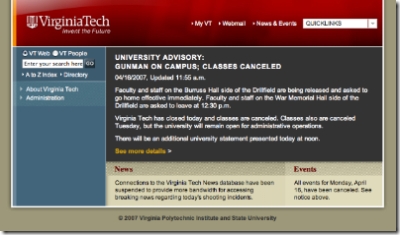Home » youtube (Page 18)
Category Archives: youtube
The Simpsons Star Wars Opening
I gather this has been around for a month at least, but I thought this mash of The Simpsons and Star Wars by Rich Cando (of Dude Films fame) was too good not to share:
[Via]
Facebook Off!
Facebook Off … when college social networking turns bad!
(Or: The Perils of Identity Theft for Beginners) [Via Sivacracy]
LonelyGirl15 is over … for the season!

So … Bree’s dead, then. Or, that should be “Bree’s dead” since her character supposedly had all of her blood transfused to someone else, but you’re not dead on television, or in videoblogs (which, in this case at least, looks like they want to be television) until your head comes clean off! If you’ve no idea what I’m on about, LonelyGirl15, the poster-child for videoblog commercial success in the YouTube era, has come to an end for this ‘season’. To be honest, I never thought the creators of LonelyGirl15 would be referring to their work in ‘seasons’, in the same terms as a TV production; for some reason it seem like a backward step to use this terminology when half the point of the project was to expand the bounds of where meaningful drama could be found, made and enjoyed! That said, since the creative property of LG15 seems to have been the heart of many a sales pitch recently, perhaps a first season (of 260 episodes, no less) is a useful way of packaging a product.
For those joining the game late, LonelyGirl15 shot to fame after the seemingly innocuous clips of 16-year old, home-schooled Bree raised the eyebrows of a few viewers who noted the slightly-too-professional look of a few episodes. There were a few tears when fans who thought Bree was real discovered she was just a character, but after the controversy died down, the series has continued to engage viewers and command a loyal following in its format of 3 to 5 minute episodes. The LG15 ‘gang’ expanded recently to include another 4 people (originally only Daniel was a regular character, and the ‘explanation’ for the show’s neat editing), and it seems that “season two” will continue the drama in the aftermath of Bree’s death (and, I wouldn’t be surprised, her shock, not-so-dead return somewhere toward the end of season two). Jessica Lee Rose who played Bree has gone on to bigger and better things (proving that videoblogs could be a jumping on point to ‘make the name’ of an actor), so her departure was inevitable.
On the commercial front, LG15 seems to have become a very successful commercial project. The rights to distribute (but not control production) of LG15 were finally won by MySpace for the 12-part season finale (and subsequent season), and as Liz Gannes this shows the robustness of the videoblog as a commercial model.
I can’t say I’ve watched the last 100 or so episodes of LonelyGirl15 that closely, or at all in many cases, and I certainly thought Bree’s demise was a little over-the-top (which you can now view on YouTube, too, here) but the overall endeavor points to a very viable alternative production model which could well see many creative teams get their feet wet before taking on the mainstream media world!
The US Presidential Race ’08 is now a pillow-fight between bikini-clad crush girls!
As Chuck and a quite a few others have pointed out, Barely Political have released another viral video, this time featuring an MTV style showdown between the singing, dancing political spokesmodel* Obama Girl and her political nemesis, Giuliani Girl:
I rather like Chuck’s description of this clip as a “a singing and dancing competition on the streets of Brooklyn that suggests a spiced up version of West Side Story, with a little politics thrown in.” As with the Obama Girl and Hott4Hill clips discussed earlier, the question as to whether these clips actually have any meaningful place in promoting political awareness is an important one. The lyrics certainly presume some knowledge of politics and of the candidates, but I suspect the demographic most likely to be watching the videos in YouTube are probably not of voting age.
As Craig Rubens from NewTeeVee asks:
Is this the “Happy Birthday Mr. President” of the YouTube era? The ladies of Barely Political owe quite a bit to the imitable Marilyn Monroe. Or is this more the Jib Jab of the 2008 election, whose This Land traveled in very much the same media circles back on ‘04?
I like the comparison with Jib Jab, as it certainly reminds us that US politics has already had its first election (’04) with viral video input, and the Crush Girl vids have some sort of history. That said, I also worry with Rubens that for all the cynicism about politics in the US, given such a narrow ranges of choices at the end of the day, these clips really could make a difference in an apathetic voter’s mind:
So, will Barely Political work its way up to political punditry levels of Stewart/Colbert? Likely not, but it’s broken new ground with the powers of viral videos, coming out with multiple iterations of a successful formula. I’d like to think that my vote won’t be influenced by Hooters girls chanting political candidates names, but like I said before, I am a member of an easily swayed demographic. So, while maybe not the most cerebral of political commentaries, Obama girl very well might be the most primal.
In a clearer light, it’s great to see Taryn Southern (who didn’t just perform, but also wrote the Hott4Hill clip) bemused by the fact that many commentators are missing the that fact that her clip, at least, is definitely satirical:
I’m still surprised at the number of people who don’t realize the video is a parody. Between Hillary’s face in Mt. Rushmore and my bikini body superimposed on George Washington crossing the Delaware, how could it get anymore silly?
Meanwhile, on the home front, the Oz in 30 Seconds citizen-produced political video campaign in Australia (run by GetUp) has entered the voting phase. Nothing as racy as the US clips, but some really impressive political commentary to be seen here!
* I’ve loved the term spokesmodel ever since hearing it for the first time in the wonderful film LA Story. I’m so pleased to finally have an appropriate context in which to use it!
Australian Politicians on MySpace this week…
The Australian ran a couple of stories today about Australian politics finding another outlet in MySpace’s ‘Impact’ website (the Australian version).
In Nicola Berkovic’s ‘Kevin has more ‘friends’ than John’, she points out that Labor is doing much better in MySpace than the Liberal Party. As Berkovic notes:
Yesterday afternoon, the Opposition Leader had more than 800 friends, while the Prime Minister had a measly seven. And most of them were fellow Liberal MPs. However, it is also a risky strategy for politicians, who are used to their minders having some degree of control over their image and political message. […]
Many of Mr Rudd’s MySpace friends are preoccupied with the issues that interest many young people: drinking, smoking and sex. […] However, Mr Rudd said, provided that people did not post defamatory or profane comments on his site, he was relaxed about losing control over his image on the internet. “It’s just life in the fast lane,” the Opposition Leader said.
I’d say Kevin Rudd’s attitude is probably a sensible one (and its not like any of the politician on MySpace are actually likely to see their own profiles). That said, in ‘MPs cast cyber net in hunt for votes’, Cath Hart points out that:
The emergence of e-campaigning in Australia is set to mirror the trend in the US, where presidential candidates have embraced the internet – for fundraising and profile building – as the 2008 race moves into full swing. Speaking at the launch of MySpace’s new political channel, Impact, yesterday, Mr Rudd described the site as the “public meeting place for the 21st century”, where his goal is “to get 50per cent … plus one more friend than Mr Howard”. “It’s a good shot in the arm for Australian democracy to keep it alive into the next century.” […]
But media and internet experts have warned Mr Rudd and the swag of other “e-MPs”, or online politicians, that social networking sites can be a double-edged sword. Internet networking expert Joanne Jacobs said the sites offered access to the “student market” of people under 24. “The trouble with these networking sites is that … they open the writer up to criticism. It also means you don’t have a moderating path to vet out unpopular comment,” she said.
Following Joanne Jacobs’ comments, I suspect the real test of Rudd’s take on social networking websites will come when he does something massively unpopular and has to deal with the backlash!
For today, thought, lets look at MySpace friends:
 Labor leader Kevin Rudd, has 3382 friends;
Labor leader Kevin Rudd, has 3382 friends;
 Julia Gillard (Deputy Leader for Labor) has 687 friends.
Julia Gillard (Deputy Leader for Labor) has 687 friends.
In the middle, Bob Brown (leader of the Greens) has 173 friends, while Democrat Senator Andrew Bartlett has 163 friends (although, already being Australia’s most web2.0-savvy politician, Bartlett already blogs extensively and has clearly stated that he only has time to treat MySpace as a re-posting space for his blog);
 Meanwhile, Australian Prime Minister John Howard only has 8 friends (and Peter Costello, oddly enough, isn’t one of them!). While the generation gap is clearly one factor, I strongly suspect that Howard’s camp simply aren’t checking friend requests (and thus Howard will probably never have more than 8 friends!). This is similar to what Jill mentions about politics in Norway, in that candidates are using online networks like MySpace or YouTube without having teams literate in how these websites actually work. (Another argument for the importance of digital literacies right there!)
Meanwhile, Australian Prime Minister John Howard only has 8 friends (and Peter Costello, oddly enough, isn’t one of them!). While the generation gap is clearly one factor, I strongly suspect that Howard’s camp simply aren’t checking friend requests (and thus Howard will probably never have more than 8 friends!). This is similar to what Jill mentions about politics in Norway, in that candidates are using online networks like MySpace or YouTube without having teams literate in how these websites actually work. (Another argument for the importance of digital literacies right there!)
Incidentally, the popularity of certain politicians doesn’t seem to be rubbing off on the youth arms of either major party: on MySpace the Young Liberals currently have 50 friends while Young Labor isn’t doing much better with 110 friends.
Returning to Australian Politics on Facebook discussed last week, Kevin Rudd is up to 1296 friends, while there still doesn’t appear to be a real John Howard. I’ll leave you to draw your on conclusions on that front!
(All friend counts and screenshots were taken between 3pm and 3.40pm Perth Time on 13 July 2007.)
Five Second Films!
I confess, I’m addicted to short, sharp edits that are representative of whole films. The ‘Re-Enacted in 30 seconds with bunnies” series, but I think I’ve not found a new addiction … the 5 second film. So far, my absolute favourite is the 2001: A Space Odyssey re-cut:
But, I must admit, the Fargo effort is pretty funny, too:
What’s your favourite?
Putting the Sex (back) into American Politics?
The process by which different US Democrats and Republicans vie for the right to be their party’s candidate for presidency has always fascinated me (admittedly, from afar, safe in the knowledge I don’t need to vote for any of these people). The race for 2004 bought out some impressive efforts in participatory culture (remember Jib Jab’s ‘This Land’?), and this years’ Hillary 1984 video promised more in the race for 2008. While the creativity is definitely out there, one trend which has been a little unexpected is the “I’ve got a crush on…” videos attached to the Democrat candidates.
First there was the self-styled ‘Obama Girl’ with her “I’ve Got a Crush on Obama” video:
The clip and the Obama Girl herself have gained a fair amount of attention in US media, most of which is linked to from Obama Girl’s website. The girl in the clip – Amber Lee Ettinger – didn’t create the concept (or sing the song; she’s lip-synching) but has become one of the key faces in Obama’s campaign. The story behind Obama Girl is found at the Barely Political website. Now, along similar lines but a little more disturbingly, Chuck Tryon has drawn my attention to the “Hott4Hill featuring Taryn Southern” clip, which runs a fine line between representing Hillary Clinton as a politician or a sexual icon(!):
And, of course, there’s a Hott4Hill blog to emphasise Taryn Southern’s efforts.While I’m still thinking about how all of this works (and wonder if these clips have the potential to damage campaigns as much as make them appealing for younger proto-voters) you might want to have a read of ‘The Power and Playfulness of Parody: Obama, Hip Hop and Misunderstanding’ by Bernie Heidkamp in Pop Politics which gives some context and perspective to the Obama Girl clip.
Academic Ethics, Privacy and Transparency … all coming soon to YouTube!
Australia’s QUT has been in the grip of a very public controversy recently which dovetails between issues of freedom of speech, academic ethics and the transparency of university processes. The controversy came to light and media attention on 11 April this year when two QUT academics, John Hookham and Gary MacLennan, published an article in The Australian entitled ‘Philistines of relativism at the gates’. In it, Hookham and MacLennan very publicly took issue with the ethics of work being done by PhD candidate, Michael Noonan:
A time comes when you have to say: “Enough!”, when you can no longer put up with the misanthropic and amoral trash produced under the rubric of postmodernist, post-structuralist thought. The last straw, the defining moment, came for us when we attended a recent PhD confirmation at the Queensland University of Technology, where we teach. Candidate Michael Noonan’s thesis title was Laughing at the Disabled: Creating comedy that Confronts, Offends and Entertains. The thesis abstract explained that “Laughing at the Disabled is an exploration of authorship and exploitation in disability comedy, the culmination of which will be the creation and production (for sale) of a six-part comedy series featuring two intellectually disabled personalities. “The show, entitled (Craig and William): Downunder Mystery Tour, will be aimed squarely at the mainstream masses; its aim to confront, offend and entertain.” (Editor’s note: the subjects’ names have been changed to protect their privacy.) Noonan went on to affirm that his thesis was guided by post-structuralist theory, which in our view entails moral relativism. He then showed video clips in which he had set up scenarios placing the intellectually disabled subjects in situations they did not devise and in which they could appear only as inept. Thus, the disabled Craig and William were sent to a pub out west to ask the locals about the mystery of the min-min lights. […]
At the seminar we were told there was a thin line between laughing at and laughing with. There is no such thin line. There is an absolute difference that anyone who has been laughed at knows. We must admit with great reluctance that at the seminar we were alone in our criticism of the project. For us, it was a moment of great shame and a burning testimony to the power of post-structuralist thought to corrupt. It is not our intention here to demolish the work of Noonan, an aspiring young academic and filmmaker. After all, ultimate responsibility for this research rests with the candidate’s supervisory team, which included associate professor Alan McKee, the faculty ethics committee, which apparently gave his project total approval, and the expert panel, which confirmed his candidacy. […]
What we have instead is the reality that cultural studies is in the grip of a powerful movement that we call the radical philistine push. It is this same movement that has seen the collapse of English studies and the consequent production of graduates who have only the scantiest acquaintance with our literary heritage. It is also undermining the moral fabric of the university.
So, what starts with ethical questions about a particular thesis, quickly becomes a much more generic complaint about the corruption of education by poststructuralist and postmodern theory and approaches. I know nothing of the people writing or mentioned in this article, but have to say after reading the piece I wasn’t swayed; my sympathies were more with Michael Noonan than anyone else, because as a PhD candidate I know I would have been almost destroyed by such public denouncing of my work. This, I should add, is not a comment on the quality on the work being or proposed – I know nothing beyond the article above and the surrounding debate, and haven’t seen any of the footage mentioned – but rather a comment on the process and the reasonable expectation that any criticism of a candidate’s work be handled within the university as long as possible. I’m not saying there is never a case for ‘going public’ with dismay about certain research, but from what I’ve read I believe Hookham and MacLennan took that step far too early. More to the point, combining criticism of a specific project with a very generic attack on a particular body of theory and its influence on teaching seems a less than generous way of dealing with the work of a PhD candidate.
The issues raised here also beg serious questions about transparency and universities. There is a lot of talk about the need to transparency of research outcomes since (most) Australian universities are at least partially publicly-funded. I quite agree with that notion. However, I think the idea of the processes of a university being taken public under the rubric of transparency tend to skew what makes it into the public arena. Selectively releasing aspects of a process (such as an ethics review process and confirmation of candidature) around research which clearly relies on careful contextualisation is bound to produce a one-sided picture. Tellingly, when Hookham and MacLennan’s article was republished in Online Opinion, the were comments from a student – using the handle WWSBD – who’d had Noonan (the candidate) as a lecturer, praising his efforts to educate student about people with disability. Moreover, this is the only place I’ve seen Noonan himself comment publicly:
I am at the student at the centre of Hookham and MacLennan’s attacks.
I thank WWSBD for understanding and appreciating my work in its context. I appreciate the words of Anecdote, who understands that a work must be seen and placed in context before it should be attacked. And I am disappointed for bedwin, who has lost all respect for me on the basis of an uninformed and incorrect article.
Much has been assumed about my project, my integrity and my intentions. Very little of it is based on truth. The simple facts are these: the excerpts I showed at my PhD confirmation seminar were presented in the context of exploring and discussing issues of authorship and representation in disability. My project seeks to empower the disabled, to give them a voice through comedy. Each clip was prefaced with my own thoughts about whether or not this had been achieved.
As a sessional staff member at QUT, I can think of nothing more deplorable than attacking a student’s incomplete research in a public forum. Hookham and MacLennan have made no effort to read my PhD confirmation document (it was offered) and they rejected my attempts to meet and discuss their concerns.
To date I have not sought to respond to their attacks in print. But I refuse to be further bullied and vilified before the public, my peers and my students.
However, the story doesn’t end there. Earlier this month The Australian report that Hookham and MacLennan are now facing a disciplinary hearing at QUT for their public comments, with the university arguing that the two unfairly attacked the candidate and his supervisory team. Now, whatever their views, Hookham and MacLennan seem to have a reputation as inspirational teachers themselves, and the news of their censure galvanized some of the QUT student body to defend their actions on the basis of free speech. The student campaign is visible through it’s “Save Our Lecturers” MySpace page. Moreover, over at Martin Hirst’s blog, he has posted ‘Freedom of Speech disabled at QUT’ which points to this documentary which is now available at YouTube:
(Hirst is a friend of Hookham and MacLennan’s, and his post also contains the full text from Hookham and MacLennan’s original article in The Australian, as well as some additional commentary from The Australian and subsequent letters to editor.)
The YouTube documentary clip, by QUT student Adrian Strong, is very compelling; Hookham and MacLennan both come across as intelligent, compassionate teachers and academics who have good cause for concern. My point here is not to judge the debate being documented in this clip – although I imagine it would be extremely compelling for many people. Rather, in the era of participatory culture and digital media, this clip is indicative of a very profound change which can see debates and arguments that once would have remained closed suddenly being open to public viewing and public debate. In such an era, digital literacy is extremely important – the ability to create, edit and share such a clip is a key part of the ability to make a case in the public eye. It’s no surprise that QUT, which has Australia’s most renowned Creative Industries faculty, should be the source of the first such debate in Australia (to my knowledge, at least).
Illustrating my point, I just noticed another posted by the same YouTube user who posted the clip above (and thus, I presume, also be Adrian Strong) which talks in even stronger terms about a perceived campaign of censorship at QUT:
(Again, let me reinforce, I don’t know enough about the other things going on to really judge this debate, but I do know that the perception of censorship certainly doesn’t add to the reputation of any university. However, like the first clip, without any further rebuttal, this clip is likely to be very persuasive to viewers.)
Update: In ‘Dissenting dons out in the cold’, Andrew Fraser reports in The Australian that the saga ended with Hookham and MacLennan both being suspended without pay for 6 months from QUT.
The Virginia Tech Shootings and Unintentional Citizen Journalism
I woke this morning to the news that 33 people were dead at Virginia Tech university in the US due to a gunman’s “shooting rampage” . Apart from the tragedy itself one line which struck me as odd in initial report I was reading from the BBC (and I struck, literally, hundreds more when I started working through the posts in the eight hours since I last looked at the aggregated news in Google Reader) was this:
Eyewitnesses said some students jumped from classroom windows to escape the gunfire, which triggered panic on campus.
Some of those locked down inside the university buildings were using the internet to try to glean information about what was happening and many e-mailed the BBC News website. [Emphasis added.]
Why would Virginia Tech students turn to the BBC for information on a real-time event happening around them in the United States? While the BBC was certainly a focal point in the aftermath of the 2005 London Bombings, this line struck me as just odd (and uncharacteristically self-important for the usually quite staid BBC). Looking a little further around the BBC website, I found this story from Virginia Tech student Nikolas Macko which describes the experience of staying inside one of the classrooms while gunshots could be heard nearby. The BBC was certainly quick off the mark with this story, so I guess if students didn’t find anything on the BBC, perhaps they sent their stories in by email or the other means the BBC has set up to highlight reports from everyday folk.
Reading further, Dan Gillmor of Citizen Media points out that most of the news stories on US television feature a cameraphone video taken by a VT student in which gunshots can be clearly heard, but not seen (the video is, of course, now available on YouTube, found via NewTeeVee).
A number of mainstream media outlets have also turned to blogs to find eyewitness and VT student testimonials. One blogger, ntcoolfool aka Bryce Carter, had mainstream media producers requesting help finding cameraphone videos after he posted a videoclip of police cars heading to the scene of the massacre. There was also a request from someone at the Boston Herald for Carter’s thoughts on social software, given that the paper was “wondering if online communication is the best way to stay in touch during a crisis“.
One of the things that stood out to me when reading some of the blog posts from Virginia Tech students, including Carter’s, was how people reacted when their blogged personal thoughts suddenly became mainstream media soundbites. For example, Carter later posted this:
As this blog has received international attention, I find myself wondering what the world has come to. The media watch dogs, no offense, have jumped on this story and on me for, as one anonymous user said, ‘exploit my emotions’. At this time I do not believe this is so, because to put it simply: I’m willing to share my experience. This is nothing special. I don’t deserve any credit. I went to class as any other student would. I just happened to be on the other side of campus when the shots were fired later in the day. But isn’t that just it? What is remarkable about this story is that this is the story of an average student at this great school. Stories of horror, bloodshed, and death are soon to come from the victims of this horrible catastrophe and the limelight will shine onwards, for that is what the public thirsts for.
For those that are interested, I will write a more complete narrative of my experiences of today later, once the media frenzy has died down and I have a minute to better reflect. As of the time I am writing this I have done a radio interview with BBC and talked with a reporter from the LA Times. CBC Newsworld, the Boston Herald, Current TV, and MTV have asked for interviews and further information. As I said I intend to share my experiences with everyone, but I want to reinstate that I am just an average student and I don’t want to be made into something I am not.
Furthermore, upon looking at a few of the posts made on this blog, I want to declare that I am OFFENDED that people are allowing this to become a political debate. People are dead. My friends could be dead. Forget bickering about trivia. Now is not the time or the place. It is the media’s job to report to the public these stories. Take it as you wish. I’m not the media. I’m just me.
A few minutes ago I walked in the hallway of the dorm frustrated with the constant contacts of media coming in every minute. In my arrogance and limited perspective I walked into a friends room while in discussion and yelled out “I hate livejournal!”, which, concerning the current emotions of campus, was not the best thing to do. Understandably, they kicked me out. [Link Via Washington Post Blog Roundup]
Carter, I have to say, seems to be handling his edge of the media spotlight rather well. His comments really emphasise that despite the ideals of citizen journalism, many forms of social software tend to allow ordinary folks to become more like eyewitnesses who are harassed into sharing their perspectives with the mainstream press, far more so than being intentional ‘reporters’ in their own right. That said, Carter’s commentary on the process itself will, I guess, have much more prominence in the aftermath of these tragic shootings. I suspect I might end up talking about Carter’s livejournal experience in a lecture in the near future, when trying to get students to ponder the difference between the initial and intended use of social software and online presence, versus what these textual (another other) online artifacts might, at some point, be used for.
Xeni Jardin’s post about the shootings at Boing Boing has lots of relevant links to citizen-produced commentary (much intentionally so), links and blogs and is a solid starting point if you’re looking to see how reportage about the VT Shootings — both mainstream and otherwise — has grown across the world wide web.
Finally, though, I wanted to share a screenshot posted to the Flickr Virginia Tech Shooting pool. This image is far from graphic, but really hit home because it’s the sort of notice which looks so banal, but says so much. The screenshot is from the Virginia Tech website and reads “Campus Advisory: Gunman on Campus; Classes Canceled“:
This left me wondering, if such a tragic event happened at my university, how would we react? I guess, at some level, that’s the thought that runs through most people’s minds and what makes these shootings feel so visceral to so many people – sympathy, of course, but empathy, too.


